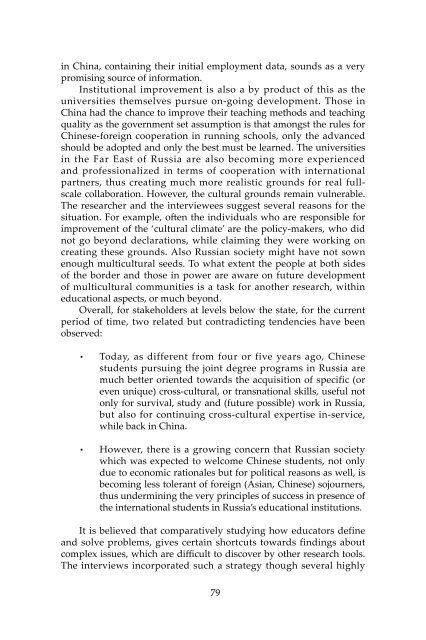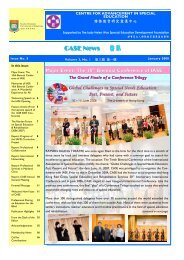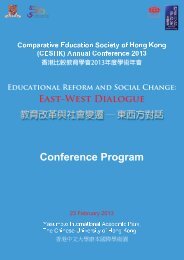Comparative Education Bulletin - Faculty of Education - The ...
Comparative Education Bulletin - Faculty of Education - The ...
Comparative Education Bulletin - Faculty of Education - The ...
Create successful ePaper yourself
Turn your PDF publications into a flip-book with our unique Google optimized e-Paper software.
in China, containing their initial employment data, sounds as a very<br />
promising source <strong>of</strong> information.<br />
Institutional improvement is also a by product <strong>of</strong> this as the<br />
universities themselves pursue on-going development. Those in<br />
China had the chance to improve their teaching methods and teaching<br />
quality as the government set assumption is that amongst the rules for<br />
Chinese-foreign cooperation in running schools, only the advanced<br />
should be adopted and only the best must be learned. <strong>The</strong> universities<br />
in the Far East <strong>of</strong> Russia are also becoming more experienced<br />
and pr<strong>of</strong>essionalized in terms <strong>of</strong> cooperation with international<br />
partners, thus creating much more realistic grounds for real fullscale<br />
collaboration. However, the cultural grounds remain vulnerable.<br />
<strong>The</strong> researcher and the interviewees suggest several reasons for the<br />
situation. For example, <strong>of</strong>ten the individuals who are responsible for<br />
improvement <strong>of</strong> the ‘cultural climate’ are the policy-makers, who did<br />
not go beyond declarations, while claiming they were working on<br />
creating these grounds. Also Russian society might have not sown<br />
enough multicultural seeds. To what extent the people at both sides<br />
<strong>of</strong> the border and those in power are aware on future development<br />
<strong>of</strong> multicultural communities is a task for another research, within<br />
educational aspects, or much beyond.<br />
Overall, for stakeholders at levels below the state, for the current<br />
period <strong>of</strong> time, two related but contradicting tendencies have been<br />
observed:<br />
•<br />
•<br />
Today, as different from four or five years ago, Chinese<br />
students pursuing the joint degree programs in Russia are<br />
much better oriented towards the acquisition <strong>of</strong> specific (or<br />
even unique) cross-cultural, or transnational skills, useful not<br />
only for survival, study and (future possible) work in Russia,<br />
but also for continuing cross-cultural expertise in-service,<br />
while back in China.<br />
However, there is a growing concern that Russian society<br />
which was expected to welcome Chinese students, not only<br />
due to economic rationales but for political reasons as well, is<br />
becoming less tolerant <strong>of</strong> foreign (Asian, Chinese) sojourners,<br />
thus undermining the very principles <strong>of</strong> success in presence <strong>of</strong><br />
the international students in Russia’s educational institutions.<br />
It is believed that comparatively studying how educators define<br />
and solve problems, gives certain shortcuts towards findings about<br />
complex issues, which are difficult to discover by other research tools.<br />
<strong>The</strong> interviews incorporated such a strategy though several highly<br />
79
















